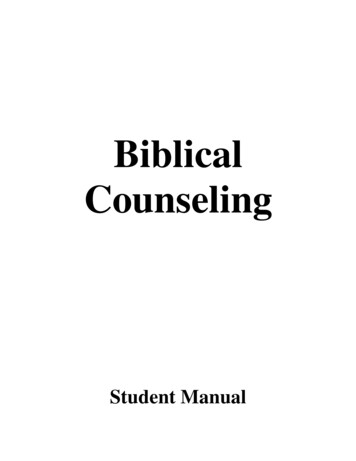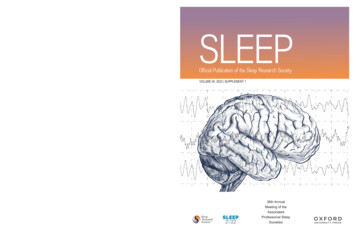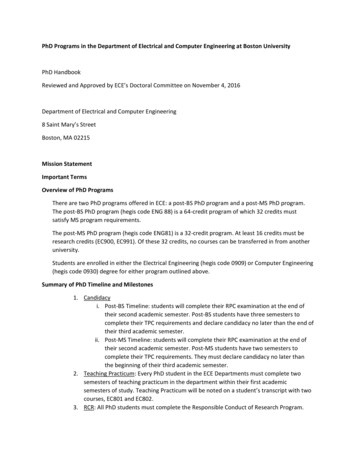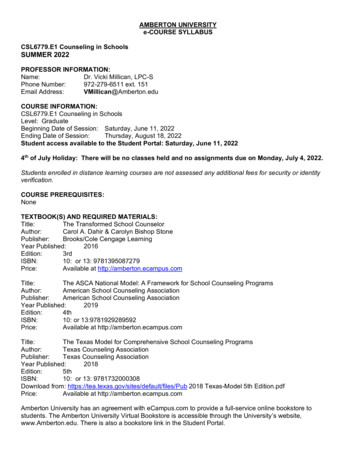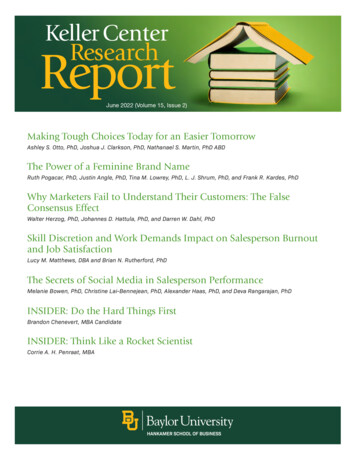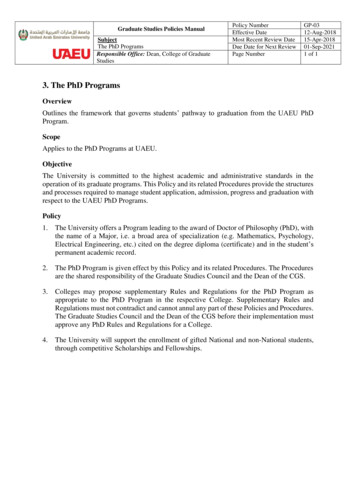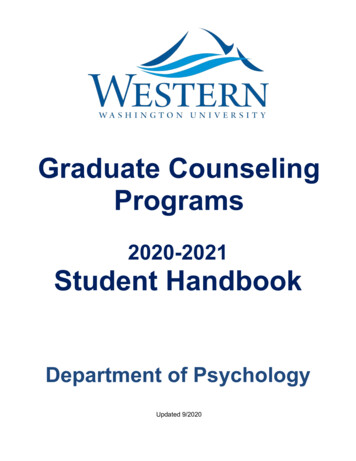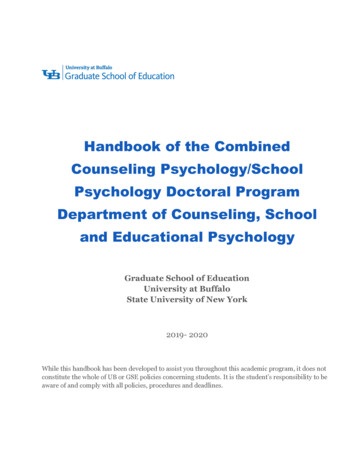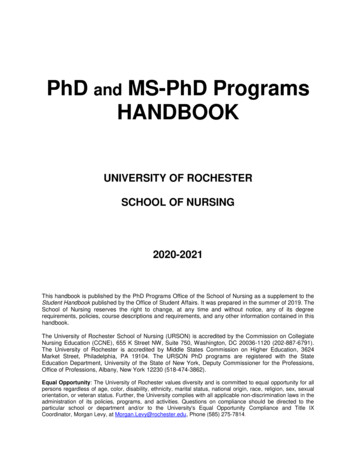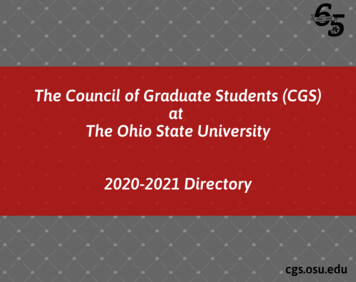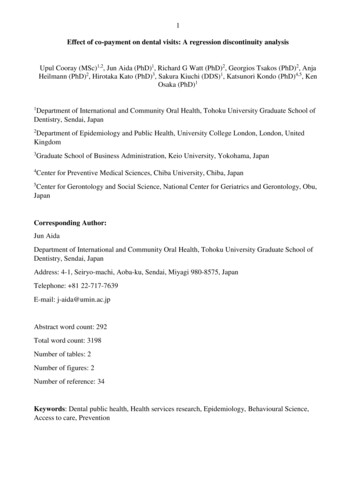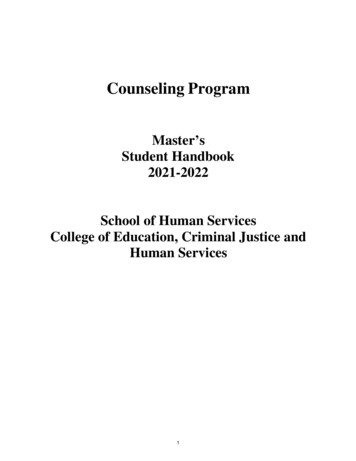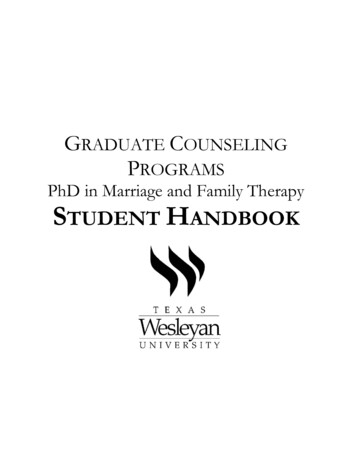
Transcription
GRADUATE COUNSELINGPROGRAMSPhD in Marriage and Family TherapySTUDENT HANDBOOK
TABLE OF CONTENTSINTRODUCTION .1ACCREDITATION.1ADMISSIONS REQUIREMENTS .1COMPOSITION OF FACULTY .2ANTI-DISCRIMINATION POLICY .2DISABILITY & ACCOMODATION POLICY .2RECRUITMENT & RETENTION .2LEAVE OF ABSENCE POLICY .3PROGRAM GOALS & STUDENT LEARNING OUTCOMES .3STUDENT/GRADUATE ACHIEVEMENTS.4TUITION.5TIME LIMITATIONS .5TECHNOLOGY REQUIREMENTS, TRAINING, & SUPPORT .5AAMFT MEMBERSHIP.5LICENSING & PORTABILITY OF DEGREE .5GRADING .5Incompletes .6Grade Appeals .6DATA COLLECTION ON GRADUATES .7CLINICAL PRACTICE COMPONENT .7TWUCCC .8CODE OF CONDUCT .8Ethical and Legal Awareness .8Standard of Conduct .9CLINICAL OBJECTIVES.9Professional Liability Insurance .10Brief Overview of Clinical Experiences .11Ethical Issue Related to Supervision & Mentoring in Practicum .11UNSATISFACTORY STUDENT PROGRESS .12Probation .13Review of Probationary Status .13
Dismissal .14Recommendation for Counseling Services .14Appeals.15ADVANCED TEACHING EXPERIENCE .15COMPREHENSIVE EXAMS .17DISSERTATION/ ADVANCED RESEARCH EXPERIENCE .18APPENDICES .20Dissertation Committee Request Form .21Student Professional Liability Insurance Statement .22Clinical Agreement Form.23Student Diversity .24Dissertation Handbook .25
Texas Wesleyan UniversityGraduate Counseling ProgramsPhD in MFTSTUDENT HANDBOOKEffective August 31, 2017Welcome to the Texas Wesleyan University PhD in Marriage and Family Therapy program. This handbook willassist you with everything you need to know to succeed in the program. This handbook is a supplement to TexasWesleyan University’s Graduate Catalog. Graduate students are responsible for knowing the informationincluded in the Texas Wesleyan Graduate Catalog and the Graduate Counseling Programs PhD in MFT StudentHandbook. The Graduate School Catalog is found at the following log.pdfThroughout this handbook, page numbers are in reference to the official Graduate School Catalog.INTRODUCTIONThe mission of the Texas Wesleyan University Marriage & Family Therapy Doctoral Studies Program is toprepare students who will function at the highest level of competence and, as a result of their training, make acontribution to the field of marriage and family therapy in regard to intervention-based research based on familysystems theory, as exhibited in their dissertation.The program is delivered and maintained from a multiculturally-informed perspective including course design,implementation, and student and faculty experience.ACCREDITATIONTexas Wesleyan University is accredited by the Southern Association of Colleges and Schools Commission onColleges to award baccalaureate, master’s, and doctoral level degrees. Contact the Commission on Colleges at1866 Southern Lane, Decatur, Georgia 30033-4097 or call 404.679.4500 (web site: www.sacscoc.org) only forquestions, comments, or issues related to the accreditation of Texas Wesleyan University.ADMISSION REQUIREMENTS Must hold a master's degree from regionally accredited institutions in marriage and family therapy,professional counseling, social work, psychology or other related mental health related field.Must have completed two of four courses required for licensure as a Licensed Marriage and FamilyTherapist in the State of Texas before admission to the program. The remaining two courses must becompleted prior to the beginning of the third year.Must have successfully obtained either a full or associate/intern license in a mental health related fieldsuch as LMFT-Associate, LPC-intern, MSW or other mental health field.Must have a GPA of 3.2 or greater on a 4.0 scale on the master's degree.1
Must have three letters of reference from a licensed therapist or counselor (LMFT, LPC, MSW) whohas known the applicant for at least three years and can attest to characteristics that would make them agood applicant for the program.COMPOSITION OF FACULTYTexas Wesleyan's Graduate Counseling Program (GCP) strives to attract and maintain full and part time facultywho demonstrate high levels of Clinical, Supervisory, and Academic skills. The Program conducts nationalsearches for new faculty and encourages minority candidates to apply for vacant positions. The Program followsthe University's hiring policies and conducts interviews of candidates to hire and maintain the best fit for the needsof a diverse student population.ANTI-DISCRIMINATION POLICYThe MFT PhD program at Texas Wesleyan University does not discriminate on the basis of race, age, gender,ethnicity, sexual orientation, relationship status, gender identity, socioeconomic status, disability, health status,religion and spiritual beliefs and/or affiliation, and/or national origin with regard to the recruitment, admission,codes of conduct, hiring, retention, or dismissal of students, faculty, and supervisors or other relevant educatorsand/or staff.DISABILITY AND ACCOMMODATION POLICYIn accordance with Wesleyan policies and state and federal regulations, the GCP is committed to full academicaccess for all qualified students including those with disabilities. To this end, the GCP makes reasonable andappropriate adjustments to the classroom environment and to teaching, testing, or learning methods to provideequality of educational access for persons with disabilities while upholding the integrity and rigor of its academicstandards. The GCP emphasizes that attainment of essential competencies and maintenance of academic andprofessional standards and licensure requirements.RECRUITMENT AND RETENTIONThe program does an online marketing campaign that is distributed to all members of TAMFT, invitingapplicants to the doctoral program and provides a lunch recruitment meeting at the TAMFT Conference eachyear. In this way, we are able to reach out to the diverse members of TAMFT through these efforts letting themknow about our doctoral program. Additionally, the university makes trips to selected MFT Masters programsin the state to recruit students and we are able to reach diverse students in this way as well. The program seeksto provide an inclusive environment for doctoral students and our welcoming and inclusive environment is ourprimary strategy for retention. The program seeks to hire diverse program staff through making our jobannouncements available and published. The program seeks to create an inclusive and welcoming environmentfor all faculty, staff, supervisors, and students.STUDENT ROLE IN GOVERNANCEThe faculty recognizes the value of students having a role in the governance of the GCP. Students are chosen bytheir peers who are members of the Honor Society to represent the graduate student body at faculty meetings, which2
are held bi-weekly to monthly in the GCP faculty office conference room. Students serve for a period of one or twosemesters. Additionally, the MFT Advisory Board, which consults with the Masters of Marriage and FamilyTherapy, contains a student member, chosen by the faculty as representative of student interests. The student on theAdvisory Board serves for a period of one academic year. POAC, (Professional Organization for AdvancingCounselors) which is the student counseling fraternity, provides communication and requests to the faculty by thePresident of POAC and is responded to by the Program Director after consulting with the Faculty.ADVISOR ASSIGNMENTSEach student in the PhD in MFT program is assigned an advisor upon admission to the program, before enrollmentin his or her first courses. Students are expected to consult with advisors at registration each term and as neededthrough the program. It is to the student’s advantage to establish an ongoing working relationship with his or heradvisor. If the need arises, a student may request a change of advisor. Students are solely responsible for theaccuracy and completion of their degree plans, and the completion of all course requirements.STUDENT GRIEVANCESThe program follows the grievance policy outlined in the graduate catalog. Informally, students are encouragedto address any concerns regarding their experience in the program with faculty, their advisor, or the programdirector.DEGREE COMPLETION REQUIREMENTSFor degree completion, students must successfully complete: 30 credit hours of core courses, 12 credit hours of researchcourses, 16 hours of practica, 1 hour of comprehensive exam studies (and successfully pass the comprehensive exam), 9hours of dissertation studies, Advanced Teaching Experience, and Advanced Research Experience.LEAVE OF ABSENCE POLICYShould a student need to take a leave of absence due to illness, family emergency or another personal situation, thestudent will notify the Director of the PhD program and the Director will call a meeting of the PhD faculty. Thefaculty will decide upon a re-entry process for the student which may include re-joining the student’s current cohortwhile taking missed classes with the younger cohort. Should the student need to leave the program during thesemester, the student will be given an Incomplete. The length of the Incomplete will be determined in the meetingwith Director and faculty. Students who withdraw from the program have up to three semesters of absence beforethey must apply for readmission, including the summer term.PROGRAM GOALS AND STUDENT LEARNING OUTCOMESThe PhD in MFT is dedicated to providing the best possible instruction and training for its students so that theyare prepared to provide quality services to clients while in the program and after graduation. To achieve thatgoal, the PhD in MFT adheres strictly to Program Goas and Student Learning Outcomes as a means ofguaranteeing that its students receive the quality education that they apply for. Courses, faculty memberperformance and program development and review is evaluated by reviewing the outcome measures that areentered into Taskstream, the online university evaluative tool.3
Program Goals:1. At the completion of the program, students will have knowledge of the role of the therapist,interventions, language, how change occurs, and leading publications of each of the major models ofFamily Therapy.2. At the completion of the program, students will have knowledge of the impact of cultural and racialdiversity on a broad range of clinical issues and the overall practice of marriage and family therapy.3. At the completion of the program, students will be able to conduct rigorous research focusing oninnovative interventions, evidence based practice, and systemic approaches.4. Students will gain understanding of professional identity, ethical issues related to the profession ofmarriage and family therapy, and the AAMFT Code of Ethics.5. Students will have the ability to work systemically with clients who are diverse in terms of presentingproblem, age, culture, physical ability, ethnicity, family composition, gender, race, religion, sexualorientation, and socioeconomic status.Student Learning Outcomes:1. Students will obtain sufficient knowledge that will show their ability to: conceptualize & distinguishthe critical epistemological issues in MFT; demonstrate their understanding of the major models ofmarriage, couple, & family therapy; and, demonstrate their understanding of the historicaldevelopment, theoretical and empirical foundations, & contemporary conceptual directions of the fieldof MFT. Students will demonstrate their ability to apply this knowledge to both teaching and practice.2. Students will demonstrate understanding of professional identity, ethical issues related to theprofession of marriage and family therapy and the AAMFT Code of Ethics.3. Students will demonstrate knowledge of research methodology in MFT including data analysis,evaluation of research, quantitative and qualitative research and its methods.4. Students will demonstrate competency in providing marriage and family therapy face to face with avariety of clients, including couples and families, while in clinical practicum, dealing with relationalissues.5. Students will demonstrate ability to work with ethnically diverse populations and teach from amulticulturally informed perspective.STUDENT/GRADUATE ACHIEVEMENTSThe first cohort of the PhD in MFT program at Texas Wesleyan University began in Fall 2014. As of the2017-2018 academic year, this cohort is in the dissertation phase, and as such the program does not yet havegraduates. 80% of students who have completed the clinical component of the program have passed theAMFTRB licensing exam and are fully licensed Marriage and Family Therapists or Marriage and FamilyTherapist – Associates in the state of Texas. Students of the program are actively involved in professionalorganizations and have conducted presentations at the national, state, and local level.4
TUITIONTuition and other fees for the GCP are listed on p. 33 in the Graduate School Catalog. All tuition, fees, androom and board charges quoted in this catalog are subject to change without notice.TIME LIMITATIONSThe program is designed for candidates to successfully complete the 68 credit hour program on a part-time basis in acohort model in four years. Graduate courses expire within ten years from the date of course completion shown on thetranscript; thus, at the time the student graduates with the PhD degree, no course may be more than ten years old. Coursestaken more than ten years prior to graduation must be retaken to meet graduation requirements. In the event that therequired course is no longer offered, a substitute course of similar content must be taken in its place. Approval to takethis course must be obtained from the Director of the Doctoral Program in Marriage and Family TherapyTECHNOLOGY REQUIREMENTS, TRAINING, & SUPPORTMany of the courses in the program are offered in hybrid format. Hybrid courses involve a combination of face toface meetings in the classroom setting and online learning activities. A computer and internet access are required tocomplete the online portion of hybrid courses. There are computer labs on campus, as well as computers in WestLibrary, available for student use. While all online learning requirements can be completed on campus, most studentsprefer to use their personal computers so that they may work remotely. The program utilizes Blackboard for theonline component of hybrid courses, and offers technology support and training through the Service Desk. TheService Desk is the point of contact for all technology requests, which are submitted using the university’s websiteat the following link: https://txwes.edu/it/. To open a ticket, check the status of an existing request, or providefeedback on service that has been completed, contact the Service Desk directly at 817-531-4428 option 1, contactBlackboard support at 817-531-4428 option 2, or servicedesk@txwes.edu.AAMFT MEMBERSHIPThe program and faculty pursue MFT professional identity in all program related endeavors. Part of MFTprofessional identity is involvement in and contribution to the community through professional organizations. Assuch, students, and then graduates, of the program are strongly encouraged to maintain AAMFT membership. Thephilosophy of the program is that professional organization membership is an essential part of professional identitythroughout the academic and professional career.LICENSING & PORTABILTIY OF DEGREEThe program requires that students have all coursework for licensure as a LMFT in the state of Texas. The programand faculty strongly encourage students to pursue MFT licensure in the state of Texas. Students should be awarethat licensure requirements differ between jurisdictions. For this reason, it is our policy to show potentialstudents and students how to use the directory of licensure boards found on the www.amftrb.org website as aresource for contacting licensure boards in other jurisdictions to inquire if the coursework, along with theirmaster's coursework, will meet the educational requirements for licensure in that jurisdiction.GRADING5
To be eligible for degree completion and graduation, the student must have earned a minimum 3.2 (on a 4.0 scale)overall grade point average and have no more than 2 “C” grades.INCOMPLETESThe grade I (incomplete) is given only when a student’s work is satisfactory but, for reasons beyond the control ofthe student, has not been completed. It is not given in lieu of an F (failing). It is the student’s responsibility to conferwith the instructor of the course and to complete the prescribed requirements of the course by the designated dateshown in the University Academic Calendar. For each I assigned, the instructor will file an Incomplete Grade Formwith the Office of Student Records. On or before the designated date, the instructor will assign a grade and report itto the Office of Student Records. If a new grade is not reported by the designated date identified on the incompletegrade form, the I automatically converts to an F per the policy in Texas Wesleyan University’s graduate catalogue.Once an F is given, students may be subject to disciplinary action and/or removal from the GCP.No grade changes may be made after one (1) year from the time the grade was originally issued. This limit alsoapplies to grades issued following completion of an incomplete (I) grade.GRADE APPEALSTimelines: Students wishing to appeal a grade must do so in a timely fashion. For grades assigned during a semester,prior to the awarding of the final grade, the appeal must be initiated before the completion of the semester.For course grades, the appeal must be initiated before the end of the following semester. For appeals of gradesassigned in the fall semester, a student has until the end of the following spring semester.For grades assigned in the spring semester, the student has until the end of the following fall semester. For gradesassigned during the summer semester, the student has until the end of the following fall semester.Process: If a student decides to appeal a grade, the student is to make an appointment with the instructor to discussthe grade assignment.If the results of the meeting with the instructor are unsatisfactory, the student is to make written request of gradeappeal to the department chair. If the department chair is absent, the appointment is to be made with the Dean. If theappeal concerns the department chair, the appointment is to be made directly with the Dean.The student must bring to this meeting a written complaint stating (a) what grade is being appealed, and (b) on whatbasis it is being appealed. The student should also bring pertinent materials such as the assignment for which thestudent was given the grade being appealed, the syllabus for the course, previous grades assigned in the course, etc.The department chair will review these materials with the student in order to ascertain the issues involved in theappeal. The department chair may request additional information from the student and/or the instructor, and willattempt to resolve the appeal between the student and the instructor.If the appeal cannot be resolved with the department chair the student has the right to appeal to the Dean. The Deanwill make a written decision to approve or deny the appeal.6
DATA COLLECTION ON GRADUATESOnce graduated, the program will perform an annual survey in August prior to the Academic Year which willprovide faculty with information that may affect their strategic planning and construction of SLO’s, PO’s andFO’s and measures for the new academic year. The policy is in the Student Handbook found on the TexasWesleyan Counseling Web Page on page5 in the Student Handbook.Below is a letter that will be sent each semester to all PhD MFT students prior to graduation which articulates ourpolicy on collecting data on graduates.Dear Students,It is important for the PhD MFT program to know about your experiences after graduation. Thisinformation allows us to better assess how well the program equips students to work in the field.There were will be an alumni survey administered each year that will include the followinginformation:1.Your place of employment2.Your licensure status3.If you have or have not passed the AMFTRB National Exam4.Your perception of the MFT Program and how well it prepares graduates for careers asMFTs.5.We will also ask your permission to speak with your employer/supervisor for their feedbackabout the program’s strengths and weaknesses in preparing people for the workplace.Additionally, the program may look at directory information published by licensure boards and theAAMFT membership list to ascertain the licensure status and AAMFT membership of ourgraduates.The information used will be kept in confidence and will serve as a means for the program toassess its effectiveness and set new strategic goals and outcomes.CLINICAL PRACTICE COMPONENTStudent experiences in clinical courses are an integral part of the PhD in MFT. During practicum, students willhave the opportunity to work with clients on and off campus at approved counseling facilities. Students will useskills developed in coursework to grow professionally through clinical experiences. The GCP Faculty considerssupervised clinical experiences the capstone of a student’s development, and all faculty members are committed tomaking this a positive experience. These clinical experiences will allow students to synthesize, integrate, refineskills, and apply the knowledge learned as part of his or her professional development.7
It is the student’s responsibility to select and secure a clinical site for practicum classes. The Texas WesleyanCounseling Center may afford students clinical opportunity but Texas Wesleyan University can’t guarantee that allclinical hours can be satisfied at this venue. It is the student’s responsibility to find and select an off campus clinicalsite to accrue sufficient clinical hours. Practicum Instructor approval must be obtained for any instance where astudent has more than one off campus clinical site.During four semesters of practicum, students must accrue a minimum of 500 clinical contact hours withindividuals, couples, families and other systems physically present, at least 40% of which must be relational.The 500 hours must occur over a minimum of twelve months of clinical practice. The 500 hours may include amaximum of 100 alternative hours or clinical activityTHE TEXAS WESLEYAN UNIVERSITY COUNSELING CENTERThe Texas Wesleyan University Counseling Center is the Graduate Counseling Program campus training clinic forgraduate students. The Center offers individual counseling for clients of all ages, couples counseling, and maritalcounseling. Counselors in training, under the supervision of GCP faculty, provide these services at a low cost. Themission of the Center is to work with families, couples, and individuals to create solutions to their problems. TheCenter is a place of respect and dignity where each person will be served and honored.The center assists clients to create practical and effective ways to solve problems, dilemmas, crises, and other lifedemands that are sometimes overwhelming. The mission is service, the goal is excellence, and the commitment isto the community and the people who come for assistance. All students engaging in a practicum clinical experienceare required to attend an orientation on Center processes and operations prior to the beginning of each semester.CODE OF CONDUCTThe GCP is a community of faculty, clinical instructors, support staff, and students involved in teaching, clinicaltraining, and learning. Students become members of this community at the time of registration in the program andassume the responsibilities that registration entails. The GCP is dedicated to providing a quality academic andclinical education and considers students to be colleagues in the learning process. GCP students are responsible fortheir actions and should be free to pursue educational objectives in an environment that promotes learning andprotects the integrity of academic processes. The Code of Conduct is designed to foster that environment.The Code of Conduct defines standards of student behavior during enrollment in the GCP and is a supplement tothe Academic Integrity Policy in the Graduate Catalog, and the Code of Student Conduct in this Handbook.Disciplinary procedures are detailed in the Student Handbook. Clinical students will also be held to the standardsof professional conduct defined by their licensure and clinical facility.ETHICAL AND LEGAL AWARENESSAny training relationship in which students take student counselor roles is considered a client / counselor relationshipand is consequently subject to all ethical and legal regulations governing such a relationship. All students in theprogram must comply with all applicable laws, licensing rules and regulations, and codes of ethics. Students areheldtothestandardsou
The program does an online marketing campaign that is distributed to all members of TAMFT, inviting applicants to the doctoral program and provides a lunch recruitment meeting at the TAMFT Conference each year. In this way, we are able to reach out to the diverse members of TAMFT through these efforts letting them know about our doctoral program.
